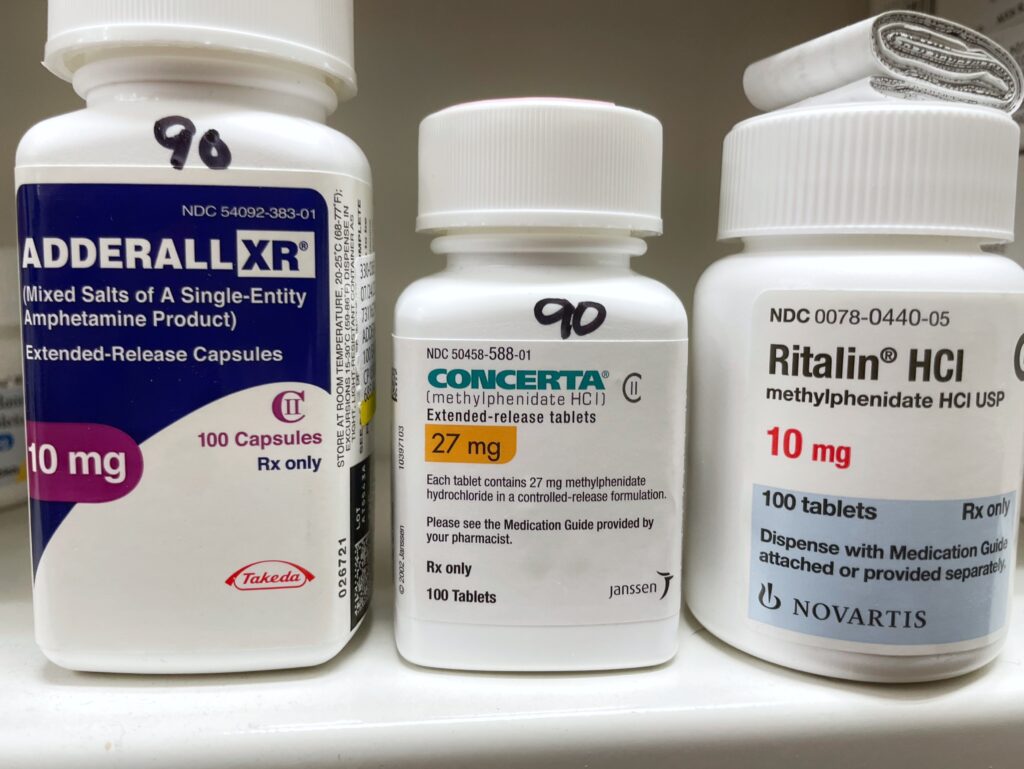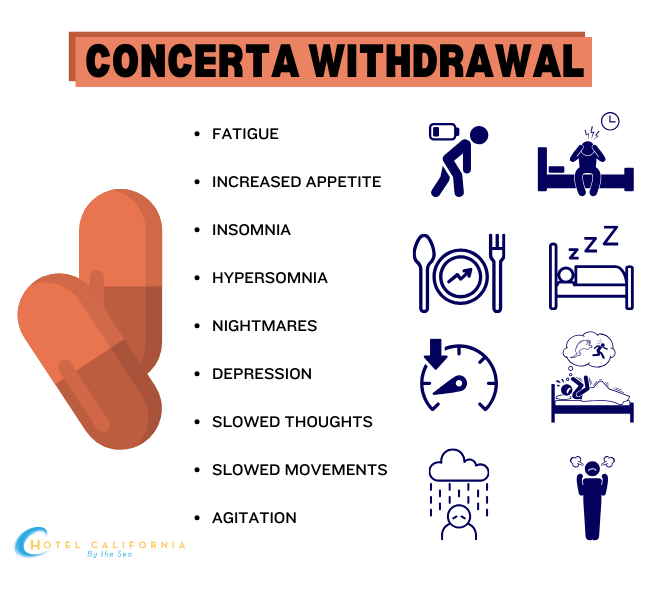What happens in Concerta Withdrawal?
Concerta or methylphenidate hydrochloride, is a stimulant prescription medication used to treat symptoms of attention deficit hyperactivity disorder (ADHD). It is a similar type of ADHD medication to Ritalin and according to the DEA, it is even more closely comparable to the illicit substance cocaine. Compared to other medications such as Adderall, Concerta only comes in an extended-release formulation that works by blocking the reuptake of chemicals such as dopamine and norepinephrine and producing sensations of energy and euphoria. This allows for more availability of neurotransmitters to be used up by the brain and body. Similar to other powerful and addictive prescription stimulants, Concerta users can develop a dependence on the drug leading to misuse and Concerta withdrawal.

Like other prescription stimulant medications, Concerta is also known to be highly addictive and commonly misused among students and young adults. It’s typically abused as a way to enhance and boost academic or athletic performance whether in school, on the field or in a professional setting. Some may even misuse the medication to lose weight as one of the side effects is appetite suppression.
Other methods of misuse and abuse include taking more of the medication than prescribed, taking it more frequently than prescribed, taking it in other ways than prescribed, mixing it with other substances and taking someone else’s prescription medication.
With prolonged use, the Schedule II Controlled Substance can cause the development of tolerance and dependence, which can lead to symptoms of Concerta withdrawal.
What is Concerta?
Concerta was FDA-approved in 2000 to treat symptoms of ADHD. The stimulant medication impacts the dopamine and norepinephrine levels in the brain. Dopamine is a chemical that increases electrical conductivity in the heart and can result in increased heart rate, blood flow, as well as focused attention, memory and planning. It can also impact executive functions such as decision-making and organizational skills. Norepinephrine is a form of adrenaline, which is a natural hormone. At lower levels, it can increase blood flow. At higher levels, it can constrict blood flow. Norepinephrine also activates the fight-or-flight responses in the brain.
Because the medication is so highly potent, even when taking the medication as prescribed by a medical provider, some people can develop a dependence on the drug. Dependence is a physical response from the body. It requires the body to continue or increase drug use in order to feel normal and function normally. When a user becomes dependent and attempts to abruptly stop or slow down drug use, it can cause the body to go into a state of Concerta withdrawal.
Symptoms and Side Effects of Concerta
- Increased alertness
- Enhanced attention
- Increased energy
- Enhanced motivation
- Improved cognition, memory and learning

What is Concerta Withdrawal?
Concerta withdrawal, also know as a Concerta Crash, occurs when the body has been so accustomed to the medication it no longer knows how to properly function without the presence of the drug. When the body goes into withdrawal, it is scrambling to quickly rebalance and recalibrate the dopamine and norepinephrine levels to a steady and normal state without the presence of Concerta.
Because the prescription stimulant is so potent, even when taking the medication per the recommendation of a medical provider, tolerance and dependence can develop and when drug use stops, withdrawal can occur.
Symptoms of Concerta Withdrawal
- Depression
- Suicidal thoughts and behaviors
- Irritability
- Anxiety
- Inability to feel pleasure
- Mood swings
- Paranoia
- Lack of energy
- Sleep disturbances and insomnia
- Intense drug cravings
- Irregular heart rate
- Irregular blood pressure
- Nausea and headaches
- Extreme fatigue
- Panic attacks and nightmares
- Increased appetite
- Psychosis
- Brain fog
- Involuntary movement disorder
- Adverse psychiatric events
- Psychomotor agitation
- Lack of motivation
Check Your Insurance Coverage for FREE
Find out if your insurance covers addiction treatment in minutes. We accept most insurance!
Concerta Withdrawal Timeline
- The first 24 hours. During the first 24 hours after Concerta drug use has stopped, withdrawal symptoms will likely appear after 12 hours and include headache, fatigue and difficulty with concentration. Users will also begin to experience intense drug cravings. They may also begin to feel severely depressed, heightened sense of anxiety and other rebound symptoms may occur.
- Days 2-7. During the following days withdrawal symptoms can begin to peak. Users can experience more intense mood swings, anxiety and irritability. For others, symptoms can also get milder.
- Days 8-14. During this stage, symptoms will begin to subside and become more manageable.
- Days 15-21. Withdrawal symptoms such as dysphoria may continue. This is more common in cases where Concerta was abused a high doses and for a long period of time.
In general, Concerta withdrawal can last anywhere from a few weeks to up to one month after discontinuation of the drug. The most severe symptoms involve mood disturbances. Not everyone will experience withdrawal the same way. Withdrawal symptoms can be more severe in those who were heavily using the drug or using it with other mind-altering substances. Severe symptoms can last for several days while milder symptoms can last up to a week.
Some people believe quitting cold turkey will be effective. However, in the case of Concerta withdrawal, going cold turkey can be very dangerous and it is recommended to detox from the drug through a gradual taper. Often times the psychological impact of Concerta withdrawal can be some of the most difficult to endure. This is especially true if patients develop feelings of depression or suicidal ideation.
In some cases, symptoms of ADHD can resurface as part of withdrawal. This is often the most difficult part of Concerta withdrawal.
Effective ways to manage Concerta Withdrawal
- Get ample sleep and rest
- Exercise and participate in physical activity regularly
- Take time to meditate and practice mindfulness
- Self-care
- Seek professional help from a therapist or counselor
- Join an in-person or online support group
Reach out to Hotel California by the Sea
We specialize in treating addiction and other co-occurring disorders, such as PTSD. Our Admissions specialists are available to walk you through the best options for treating your addiction.
Are you looking for treatment for Substance Use Disorder?
Concerta, Adderall and Ritalin are popular stimulant prescription medications used to treat symptoms of ADHD. These types of medication, especially Concerta, can become highly addictive and result in symptoms of withdrawal when drug use has stopped or slowed down. Concerta withdrawal is usually treated through a supervised detox taper, with concern for the uncomfortable and dangerous side effects that can occur. Behavioral health treatment programs such as Hotel California by the Sea provide an effective approach to tackling a substance use disorder.
We provide treatment at all levels of care including medical detox, inpatient residential, partial hospitalization program and intensive outpatient program. We understand our clients’ needs when it comes to treatment of their substance use disorder. Developing a dependence and addiction to Concerta can be dangerous and difficult to overcome. We provide evidence-based treatment methods including CBT, DBT and other forms of individual and group counseling. Hotel California by the Sea is dedicated to addressing all aspects of addiction: physical, psychological and emotional. We provide the tools, resources and support clients need to get healthy and maintain their sobriety.
References:
https://www.addictioncenter.com/stimulants/concerta/withdrawal-detox
https://www.alternativetomeds.com/blog/concerta
https://recovered.org/stimulants/concerta-methylphenidate/concerta-withdrawal-symptoms
https://zinniahealth.com/substance-use/concerta/withdrawal
https://www.rehabspot.com/drugs/stimulants/concerta/withdrawal-detox
https://www.addictions.com/stimulants/concerta-withdrawal
https://www.choosingtherapy.com/concerta-withdrawal/
